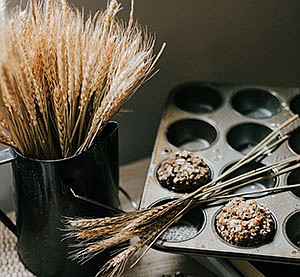Finding food for the soul at the kitchen table
May 10, 2023 at 6:39 p.m.

Nowhere was that more obvious than at the kitchen table, whether baking, cooking, sharing a meal or having a boisterous conversation with sweets and lots of coffee when extended family, usually my mom’s, arrived.
My dad was a storyteller. He was known for sharing stories that spanned the topics of the many books in his library (including the Bible) and the experiences he had during the Depression, his stint in the army, his trip to Ireland and the hijinks that went on where he worked. He loved it.
He would have been comfortable in school with Socrates, though he might have asked Socrates to move over and give him the floor. He favored waxing philosophical over a piece of apple pie with sharp cheese and a cup of coffee.
My mother taught by example. From her I began to learn the lessons of relationships through her frequent visits to sick or lonely family members, friends or acquaintances, and from the high school students who would run through the supermarket aisles toward her yelling, “Mrs. Clifford!!” with their arms open for a big hug. She was a school secretary, but you would have thought she was the queen.
My mother would enter a room with a smile to warm any heart, a plate of freshly made Jiffy muffins and everyone would begin to feel better. She was love in a dime-store apron. When she got out her muffin tin, the question was, “Who’s sick?” or “Who’s visiting?” Who knew Jiffy muffins would be food for the soul.
[[In-content Ad]]
She didn’t talk about God or religion, but sometimes while making fresh Syrian bread she would share how much she loved her small Syrian Orthodox Church. She would talk about the incense, the singing in Arabic, the gathering of families who all knew each other, the traditions, and the sense of belonging.
The image of her recollections became the foundation for what I expected church to be. Though I remembered going to Mass with her on occasion, it was the joy in her voice when she shared her memories that lit a desire to find that same experience of church for myself.
I sold my parent’s kitchen table in a garage sale the year after they died. I tried to remind myself it was just a table; the memories would always be there. But when it came time to get rid of my own kitchen table, set nightly for eight or more and bearing the expected scars of a house full of children, it wasn’t just me who balked. My husband, being stoic, took it apart and stored the table and all the chairs in an upstairs unused bedroom. “You never know,” he said.
Then I read a column from friend and colleague, Lois Rogers, reflecting on the memories of her family table. She wrote, “The number of graces prayed over the food spread out on its surface like manna on holy days, holidays and sacramental occasions is incalculable. The bread broken at that table among relatives and friends was something like loaves and fishes, especially in the lean times everyone shared at one time or another.”
I bawled like a baby, but it was cathartic, and led me to further reflection over the years. After all, Jesus was known for his invitations to share a meal, and as good as pita bread is, I think his reasons were more about food for the soul.
Mary Clifford Morrell is the author of “Things My Father Taught Me About Love” and “Let Go and Live: Reclaiming your life by releasing your emotional clutter.”
Related Stories
Wednesday, December 31, 2025
E-Editions
Events
Nowhere was that more obvious than at the kitchen table, whether baking, cooking, sharing a meal or having a boisterous conversation with sweets and lots of coffee when extended family, usually my mom’s, arrived.
My dad was a storyteller. He was known for sharing stories that spanned the topics of the many books in his library (including the Bible) and the experiences he had during the Depression, his stint in the army, his trip to Ireland and the hijinks that went on where he worked. He loved it.
He would have been comfortable in school with Socrates, though he might have asked Socrates to move over and give him the floor. He favored waxing philosophical over a piece of apple pie with sharp cheese and a cup of coffee.
My mother taught by example. From her I began to learn the lessons of relationships through her frequent visits to sick or lonely family members, friends or acquaintances, and from the high school students who would run through the supermarket aisles toward her yelling, “Mrs. Clifford!!” with their arms open for a big hug. She was a school secretary, but you would have thought she was the queen.
My mother would enter a room with a smile to warm any heart, a plate of freshly made Jiffy muffins and everyone would begin to feel better. She was love in a dime-store apron. When she got out her muffin tin, the question was, “Who’s sick?” or “Who’s visiting?” Who knew Jiffy muffins would be food for the soul.
[[In-content Ad]]
She didn’t talk about God or religion, but sometimes while making fresh Syrian bread she would share how much she loved her small Syrian Orthodox Church. She would talk about the incense, the singing in Arabic, the gathering of families who all knew each other, the traditions, and the sense of belonging.
The image of her recollections became the foundation for what I expected church to be. Though I remembered going to Mass with her on occasion, it was the joy in her voice when she shared her memories that lit a desire to find that same experience of church for myself.
I sold my parent’s kitchen table in a garage sale the year after they died. I tried to remind myself it was just a table; the memories would always be there. But when it came time to get rid of my own kitchen table, set nightly for eight or more and bearing the expected scars of a house full of children, it wasn’t just me who balked. My husband, being stoic, took it apart and stored the table and all the chairs in an upstairs unused bedroom. “You never know,” he said.
Then I read a column from friend and colleague, Lois Rogers, reflecting on the memories of her family table. She wrote, “The number of graces prayed over the food spread out on its surface like manna on holy days, holidays and sacramental occasions is incalculable. The bread broken at that table among relatives and friends was something like loaves and fishes, especially in the lean times everyone shared at one time or another.”
I bawled like a baby, but it was cathartic, and led me to further reflection over the years. After all, Jesus was known for his invitations to share a meal, and as good as pita bread is, I think his reasons were more about food for the soul.
Mary Clifford Morrell is the author of “Things My Father Taught Me About Love” and “Let Go and Live: Reclaiming your life by releasing your emotional clutter.”










